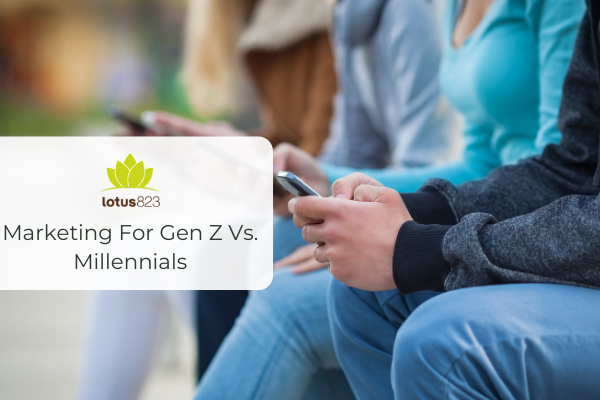In marketing, it’s important to understand that different audiences require different strategies. In recent years, there has been a major misconception that Gen Z and millennials are the same group of consumers and are interested in the same products. However, extensive research has shown that there are dozens of key differences between the two and that marketers must create different kinds of campaigns for each audience. Read on for tips on how to market to Gen Z vs. millennials!

Wait, Who’s Who?
According to studies done by Pew Research Center, 1996 is the last birth year for millennials. Anyone born between 1981 and 1996 is considered a millennial, and anyone born from 1997 through until the 2010s is part of a newer generation, Generation Z.
Aside from age groups and birth years, there are fundamental differences that highlight the need for different marketing strategies for millennials and Gen Z.
Technology
Major technological advancements were made between the years 1981 and 2020. Millennials grew up using DVD players, giant personal computers, cell phones, and dial-up internet. In comparison, Gen Z had access to iPads, smartphones, Wi-Fi, and streaming services that were groundbreaking. Those from Gen Z have been immersed in technology, the internet, and social media nearly from birth.
Gen Z also spends significantly more time online than millennials, but that doesn’t mean that they have a better attention span for content. While millennials will pay attention to content for 12 seconds, Gen Z enjoys shorter, 8-second video content. This means that marketing to millennial audiences can be more in-depth, like long-form videos or branded podcasts. Marketers for Gen Z may see better results with short-form videos on Tik Tok or Instagram Stories.
Buying Habits
Millennials and Gen Z share a concern for finances and investments in their careers, like higher education and career workshops. However, millennials are more prone to buying products or services that will give them a positive experience. On the other hand, Gen Z is more focused on savings and practicality, which may have to do with being born into a recession.
Gen Z fully recognizes the high unemployment rates and the poor job market in their lifetime. Therefore, they’re bound to be frugal with spending habits unless the product can benefit them long-term. If you’re looking to market to this generation, you’ll want to show how your product can help them in their daily lives. Millennials, however, like instant gratification and are more likely to splurge a little bit.
Authenticity in Branded Content
Branded content appeals to each generation, but Gen Z prefers to learn about products on social media, through videos, or by way of influencer marketing. Millennials respond better to online ads, long-form video content, social media ads, and branded podcasts.
Authenticity cannot be spared when it comes to Gen Z. They desire transparency from brands. Coined as the “socially conscious” generation, Gen Z is much more concerned with whether their purchases are sustainable, ethically-sourced, or even fair trade. While Millennials will readily trust and make purchases from traditional advertisements, Gen Z would be more willing to buy after watching their favorite influencer describe a sustainable, cost-effective product.
Now that you’ve learned a little more about each generation’s background, here’s an outline to keep in mind when creating effective marketing campaigns for each:
Gen Z:
- Influencer marketing
- Short-form video content like Tik Tok, Instagram Reels and Stories, and YouTube
- Mobile-only content
- Authenticity
- Cost-Effectiveness and long-term use
Millennials:
- Multimedia content
- Long-form video content: Facebook, YouTube, or Instagram
- Branded podcasts
- Entertainment and experience-focused
Need help forming your Gen Z or millennial-focused marketing strategy? Contact us!






